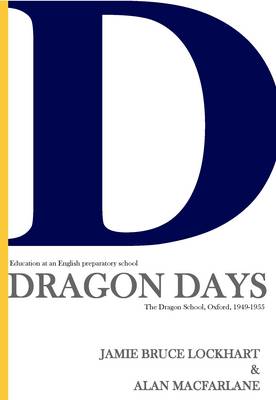This book is an experiment undertaken fifty-seven years on by Jamie Bruce Lockhart and Alan Macfarlane to try to recall and analyse their life at an English boarding school (Dragon School, Oxford) between 1949 and 1955. The book is a period piece and also an account of a rather special school. This has both advantages and disadvantages. It means that the school cannot be held to be representative of preparatory boarding establishments of that time. On the other hand, the Dragon appears to us to be interesting both in the way it was run and in the kind of pupils it recruited and what it made of them. The school was founded on concepts which went against much of the educational philosophy of late Victorian imperial education, even if it also retained much of an earlier Edwardian tradition of boarding schools in which our teachers had been reared. Unlike St. Cyprian's of the early twentieth century as described by some of its old boys including Cyril Connolly and George Orwell, the school tried to overcome some of the traumas of this kind of socialization.
It forms a bridge between the muscular Christian, imperialist, attitudes of the aftermath of Thomas Arnold through to our modern, post-imperial, world. It is also an interesting school because of the later distinction of a considerable number of its former pupils. n a wide variety of fields The Dragon has helped to shape our national life and it is now helping to educate new rulers who are sending their children to it from China, Japan, India and elsewhere. This remarkable effect, and the atmosphere it has created, leads some who have the experience which qualifies them to make a judgement on its relative merits as a school. One such view is the appraisal of Sir Eric Anderson, an important and widely experienced teacher. He taught at Fettes and Shrewsbury schools, was a most distinguished headmaster of Abingdon School and of Eton, was later Rector of Lincoln College, Oxford and Provost of Eton. The schools he was involved with received a number of Dragons, and his children and grand-children went to the school. 'First, they're not a type; they're all individuals.
The Dragon does not mould boys; it encourages them to become more interesting and lively people but still to be basically themselves - Secondly, Dragons are very good with adults; easy, talkative, direct and frank. They treat you from the first meeting as an intelligent equal. I put that down to the exceptional relationship between masters and boys at the Dragon School, that unique easy familiarity which somehow, despite the nicknames, co-exists with mutual respect. Thirdly, they expect to do well and expect to have fun while doing it. Again that is inculcated by the spirit of the school. You worry that at some of the schools to which they go on life cannot possibly be quite as good. In my view the Dragon School is quite simply the best preparatory school in the world.
- ISBN10 0857182005
- ISBN13 9780857182005
- Publish Date 16 March 2012
- Publish Status Active
- Publish Country GB
- Publisher Paul Ferguson
- Imprint The Village Digital Press
- Format Paperback
- Pages 576
- Language English
